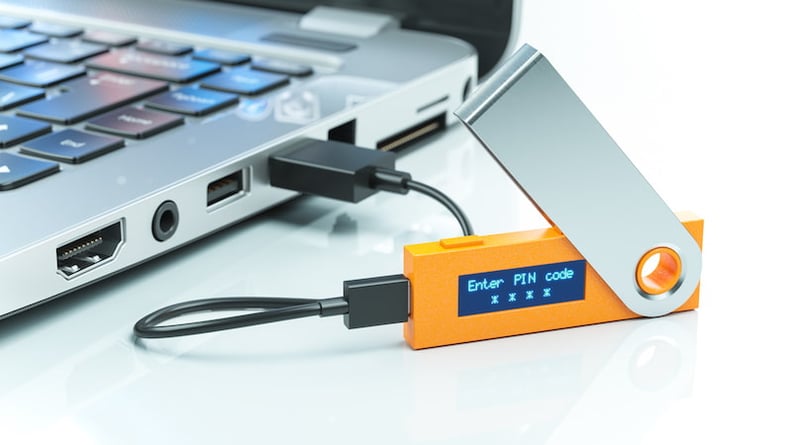Get The Down Low on Crypto: Seven Terms You Need to Know

Estimated Reading Time: 4 minutes
Investors have been flocking to cryptocurrency for the last several years, and the trend does not seem to be slowing down.
Since cryptocurrency is an alternative asset, you have the option to invest in it with a self-directed IRA (SDIRA) and grow your retirement portfolio in a tax-advantaged way. But before you get started, here are some of the terms you need to know to navigate the crypto space.
Seven Crypto Terms to Help You Get Started
Decentralized Currency
Cryptocurrencies were created as digital, decentralized currencies which are peer-to-peer coins that can be exchanged without a third party, such as a bank. The initial goal of this decentralized currency was to allow people more control over their money without relying on third parties. It was also designed to eliminate the possibility of a single point of failure in the market. The decentralized nature of cryptocurrency means that no one person has control of all the data and transactions, but the information on the blockchain is shared by all.
Blockchain
Cryptocurrencies are created with cryptography and kept on a public digital ledger that verifies transactions on a blockchain. Blockchains are a data storage system that structures data into blocks. These blocks are then linked together with cryptography, creating a chain. The cryptography combined with the public ledger makes crypto extremely secure.
Coins
Cryptocurrencies are created as coins, but it is important to remember that these coins are not physical. You might also hear coins referred to as tokens. Every crypto coin or token represents an asset and is registered as a ledger entry on a blockchain. Like physical coins, crypto coins can be an investment asset, traded, and used to make purchases.
Keys
All cryptocurrency is traded in a wallet, and all wallets are secured by keys. Keys are simply a unique password that is sometimes called a “key password.” In the event that someone loses their crypto wallet keys, there is absolutely no way for them to recover their cryptocurrency. This is why it is important to understand the wallet and key setup for your investments.
Exchanges
Although crypto was originally designed as a decentralized currency that could be held by individuals, the shift in the crypto market has been toward more centralized exchanges. These exchanges are platforms that allow investors to purchase crypto. The platform then holds the crypto in an aggregated wallet. They hold your private keys, and you access your account with a password set up. Some popular exchanges you may have heard of are Coinbase, Kraken, and Binance.

Storage
Crypto can be stored online or offline. Online storage is called hot storage, and offline storage is called cold storage. Although cryptography makes cryptocurrency secure, online platforms that hold cryptocurrency in hot storage are still able to be hacked. Cold storage often has additional fees or requires a device, but in cold storage your crypto is not online and more secure.
Wallets
There are three types of crypto wallets. Each of these wallets involves a different setup process, incurs different fees, and provides different options for holding keys and accessing hot and cold storage.
Hosted
Hosted wallets exist on a crypto exchange. An exchange is a centralized platform where you can purchase and sell crypto. On an exchange you will have a hosted wallet, which means your crypto will be kept in a wallet, but you are not in control of the wallet. What that means is that you will not hold the keys. While this may limit some capabilities–like only being able to buy the currencies offered by the exchange–it also has the added convenience that you do not have to keep a wallet key safe. Exchanges are largely hot storage, but some do offer cold storage options for a fee.
Non-Custodial
Non-custodial wallets, or self-custody wallets, are wallets that you control yourself and access through a wallet app you choose. Some popular wallet apps are MetaMask, Coinbase Wallet, or Trust Wallet. These software-based wallets provide greater control and more options for how you invest with crypto. With a non-custodial wallet, you are responsible to hold on to your key. These software wallets are connected to the internet and only offer hot storage.
Hardware
Hardware wallets are physical devices that hold your crypto keys. They are about the size of a thumb drive, and they assure that your keys are kept safe offline in cold storage. While they do provide more security, they cost more than a wallet on an exchange or a non-custodial wallet. With a hardware wallet, you can connect to any number of apps to purchase and manage your crypto, all while keeping your keys safely stored offline.
Start Investing with Crypto
Now that you’re familiar with the crypto terminology, you might want to learn how to invest in crypto with your SDIRA. Feel free to check out our cryptocurrency webpage or our blog, How to Invest in Cryptocurrency with Your SDIRA to get started.
And if you don't have an SDIRA, download our Self-Directed IRA Basics Guide to learn how self-direction lets you invest in almost any asset and build your retirement portfolio your way.
And if you want to keep this list handy, download our Crypto Terminology List.






























0 Comment